![]()
![]()
by Ben Kettlewell
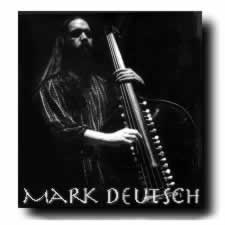 Mark
Deutsch is the inventor of the Bazantar, a hybrid of a sitar and a
double bass comprised of a five-string Grunert acoustic bass,
modified with the addition of four drone strings. These four drone
strings pass just above an extension of the original bridge, where 29
sympathetic strings have been added, which are located in a separate
box beneath the fingerboard, passing over a bridge of their own. At
present, he uses the modal tuning D-A-D-A-D for the five bass
strings. As one might imagine, the instrument is capable of producing
a tonal range of immense proportion; the result of it's ergonomic
design and it's hybrid blend of classical Western and Eastern musical
structures. A virtual self-contained orchestra, the bazantar
resonates with the power and intensity of a Buddhist choir. The
incredibly resonant timbres of the Bazantar, whether bowed or plucked
in the lower octave or soaring across the fingerboard three octaves
higher, produce an amazing variety of tonal colors. To a great
extent, this is created by the ringing of the sympathetic strings,
but also the modal tuning of the bass. The overall design of the
instrument, which Mark describes as "energy-conserving and
tension-minimizing", is perhaps another factor in the end result.
Mark
Deutsch is the inventor of the Bazantar, a hybrid of a sitar and a
double bass comprised of a five-string Grunert acoustic bass,
modified with the addition of four drone strings. These four drone
strings pass just above an extension of the original bridge, where 29
sympathetic strings have been added, which are located in a separate
box beneath the fingerboard, passing over a bridge of their own. At
present, he uses the modal tuning D-A-D-A-D for the five bass
strings. As one might imagine, the instrument is capable of producing
a tonal range of immense proportion; the result of it's ergonomic
design and it's hybrid blend of classical Western and Eastern musical
structures. A virtual self-contained orchestra, the bazantar
resonates with the power and intensity of a Buddhist choir. The
incredibly resonant timbres of the Bazantar, whether bowed or plucked
in the lower octave or soaring across the fingerboard three octaves
higher, produce an amazing variety of tonal colors. To a great
extent, this is created by the ringing of the sympathetic strings,
but also the modal tuning of the bass. The overall design of the
instrument, which Mark describes as "energy-conserving and
tension-minimizing", is perhaps another factor in the end result.
The concept behind Mark's instrument design is reminiscent of another instrument, the Mohan Vinå, designed and built by master Indian musician V. M. Bhatt ( "Meeting by the River" with Ry Cooder, Water Lily Acoustics). The Mohan Vinå, is in essence, a hybrid of a 30's arch-top jazz guitar and a sitar. It looks like a standard guitar with five drone strings, three melody strings, and fifteen resonating strings. The tuning pegs for the drone and melody strings are located in the usual place on the head stock of the guitar. The sympathetic strings, like those on the Bazantar are located on extensions on each side of the neck with tuning pegs. Mark's instrument is much more sensitive at picking up the resonance from the sympathetic strings.
Mark doesn't play in a standard tempered tuning, but draws his
sound from over sixty-six other harmonically resonant divisions of
the octave. These are artfully transcribed in the accompanying
booklet to his critically acclaimed album, 'Fool'. Below is a diagram
of Mark's composer notes, designed to help guide the listener in
understanding the musical structure of 'Fool'. A three page fold-out
graphic display representing the piece, Illustrates the evolution of
"a being that is wise enough to be a fool - a fool for something, be
it art, music, science, or love."
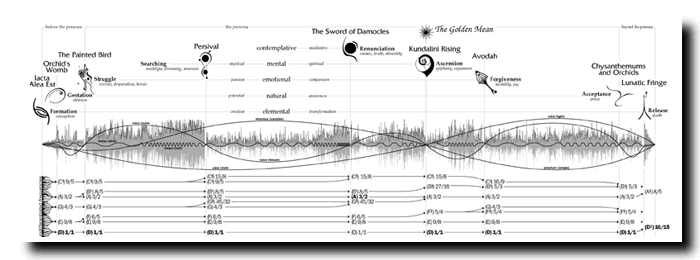
Drawing from a background in classical training as a bass player, with a great deal of experience in working with orchestral ensembles, global folk traditions, jazz ensembles, and numerous solo sitar performances, Deutsch brings the diverse elements of these musical personalities together to achieve his unique musical vision.
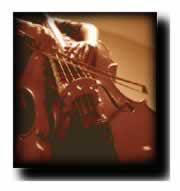 Mark
began playing professionally at the early age of twelve. During his
career, he has delved into many genres and instruments while studying
with an eclectic range of instructors. Among them, are Henry Loew,
principal bassist for the Saint Louis Symphony Orchestra. The album
"Fool" is dedicated to the memory of Henry Loew (1922-1996). Mr. Loew
served as principal bassist for the St. Louis Symphony from 1949 up
till 1992. Other teachers have included Ustad Imrat Khan, the
renowned North Indian classical sitarist, Titos Sompa, a Congolese
percussionist, and last but not least; Rufus Reid and Mark Johnson,
two world-class jazz bassists.
Mark
began playing professionally at the early age of twelve. During his
career, he has delved into many genres and instruments while studying
with an eclectic range of instructors. Among them, are Henry Loew,
principal bassist for the Saint Louis Symphony Orchestra. The album
"Fool" is dedicated to the memory of Henry Loew (1922-1996). Mr. Loew
served as principal bassist for the St. Louis Symphony from 1949 up
till 1992. Other teachers have included Ustad Imrat Khan, the
renowned North Indian classical sitarist, Titos Sompa, a Congolese
percussionist, and last but not least; Rufus Reid and Mark Johnson,
two world-class jazz bassists.
Deutsch is continuing to explore new performance techniques made possible by the Bazantar's unique construction. His melding of non-linear mathematical principles and multicultural musical influences is deeply embedded in both his composition and playing technique. His innovations, in the stringed instrument realm, are light years ahead of his contemporaries. He breaks down all barriers, defying musical categorization, creating a unique new irresistible musical voice.
"Fool" is a composition for solo performance on sitar and bazantar, consisting of a prelude, five movements and a postlude. Mark confidently combines traditional structures of Western classical music with the contemplative precision, melodic mantras and tonal characteristics of Indian traditional music, and the vibrant openness of jazz improvisation. Like the late bass virtuoso, Jaco Pastorious, Mark Deutsch is a bassist who can carry not only the rhythm, but the harmony and melody as well, in Mark's case, extremely well. Although Mark's album "Fool" is linear in its narrative musical dialogue as demonstrated in the chart above. The thematic structure of "Fool" is a tonal metaphor that ripples outward from its core, swirling like a Sufi dancer.
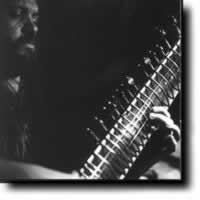 Lacta
Alea Est, the petite opening composition, is a tone poem,
relentless in it's resolve and faithful its intent. The title refers
to Julius Caesar's famous quote; "The die is cast". Mark utilizes
ancient ethnic percussion, Tibetan balls and Chinese balls to
punctuate the mood of the piece. Orchid's Womb, the second
piece, is performed on solo sitar, which further expands on the mood
created by opening composition, Iacta Alea Est. Mark creates a
sense of tonal stories translated through the music. It's this form
of storytelling that gives life to Orchid's Womb, as well as
it's correlative composition, Chrysanthemums and Orchids, and
to the album as a cohesive whole. The Painted Bird continues
the journey from the worldly to the intimate inner realm as it colors
both emotional and musical tones with cutting-edge approaches
&endash; visceral as well as cerebral. This piece is a wonderful
introduction to the Bazantar, with the rich harmonic foundation of
the double bass and the captivating resonance of the sympathetic
strings. Meaning "the work of one's life", Avodah demonstrates
the insight and concentration of Mark's arrangements and the
visionary diversity of his compositions. Persival, the
desperate seeker in European mythology, is a sitar performance that
creates a classic pantomime of the questing hero in its timbral
journey, a dualistic portrayal, creating a paradox in the form of a
smoothly metered raga that brings Persival's adventure
to a dramatic conclusion. Kundalini Rising is an extremely
delicate piece, created with sublime sensitivity, technical assurance
and a broad palette of textures. Even the most casual listener will
be captivated by the ebullience of Mark's playing, mesmerizing
timbres which dissolve and slip effortlessly into the psyche.
Lacta
Alea Est, the petite opening composition, is a tone poem,
relentless in it's resolve and faithful its intent. The title refers
to Julius Caesar's famous quote; "The die is cast". Mark utilizes
ancient ethnic percussion, Tibetan balls and Chinese balls to
punctuate the mood of the piece. Orchid's Womb, the second
piece, is performed on solo sitar, which further expands on the mood
created by opening composition, Iacta Alea Est. Mark creates a
sense of tonal stories translated through the music. It's this form
of storytelling that gives life to Orchid's Womb, as well as
it's correlative composition, Chrysanthemums and Orchids, and
to the album as a cohesive whole. The Painted Bird continues
the journey from the worldly to the intimate inner realm as it colors
both emotional and musical tones with cutting-edge approaches
&endash; visceral as well as cerebral. This piece is a wonderful
introduction to the Bazantar, with the rich harmonic foundation of
the double bass and the captivating resonance of the sympathetic
strings. Meaning "the work of one's life", Avodah demonstrates
the insight and concentration of Mark's arrangements and the
visionary diversity of his compositions. Persival, the
desperate seeker in European mythology, is a sitar performance that
creates a classic pantomime of the questing hero in its timbral
journey, a dualistic portrayal, creating a paradox in the form of a
smoothly metered raga that brings Persival's adventure
to a dramatic conclusion. Kundalini Rising is an extremely
delicate piece, created with sublime sensitivity, technical assurance
and a broad palette of textures. Even the most casual listener will
be captivated by the ebullience of Mark's playing, mesmerizing
timbres which dissolve and slip effortlessly into the psyche.
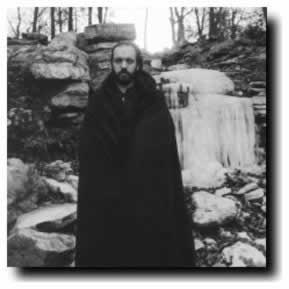 The
apex of the album is the bazantar composition, The Sword Of
Damocles. Damocles was a courtier in ancient Syracuse. According
to legend, he was seated at a banquet beneath a sword suspended by a
single hair. The sword of Damocles, therefore, has come to represent
any imminent disaster. The final song on the album, Lunatic
Fringe, brings the musical cycle full circle with a similar sense
of pathos to Lacta Alea Est, the opening piece. It resonates
like a Tibetan chant, a singular, reverberant timbre from a chime
calls out, a pattern of the eternal cycle of life, yin and yang. In
his musical interpretation, Mark's strong lyrical approach presents a
smooth melodic foray of quiet passion and longing. His playing is
wrenchingly emotional and evocative, conveying pathos, fervor, and
undying conviction.
The
apex of the album is the bazantar composition, The Sword Of
Damocles. Damocles was a courtier in ancient Syracuse. According
to legend, he was seated at a banquet beneath a sword suspended by a
single hair. The sword of Damocles, therefore, has come to represent
any imminent disaster. The final song on the album, Lunatic
Fringe, brings the musical cycle full circle with a similar sense
of pathos to Lacta Alea Est, the opening piece. It resonates
like a Tibetan chant, a singular, reverberant timbre from a chime
calls out, a pattern of the eternal cycle of life, yin and yang. In
his musical interpretation, Mark's strong lyrical approach presents a
smooth melodic foray of quiet passion and longing. His playing is
wrenchingly emotional and evocative, conveying pathos, fervor, and
undying conviction.
In conclusion, Mark Deutsch has produced an album which is a totally involving experience. It is an expression of the depth and beauty of life, where each track has a sense of dignity, and tenderness that is genuinely touching. An album to listen to with your ears connected to your heart.
Contact and Purchasing Information,
email to: mark@bazantar.com
website: http://www.bazantar.com/
The CD "Mark Deutsch - Fool..." is available at AMAZON.COM!
This site is copyrighted ®© AMP/Alternate Music Press, 1997-2024. All Rights Reserved.
Unauthorized duplication and distribution of copyrighted material violates
Federal Law.